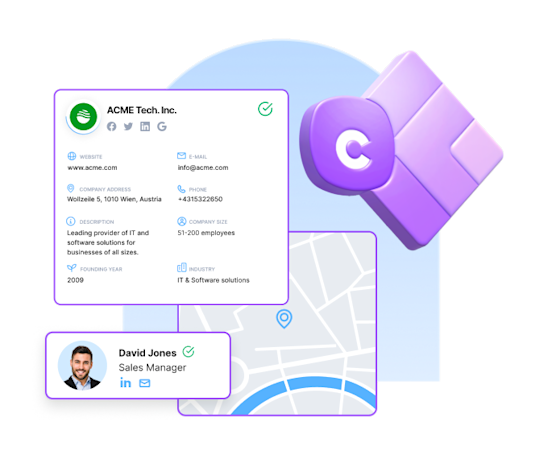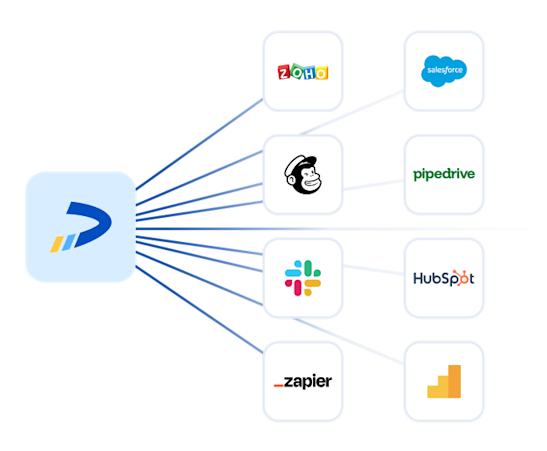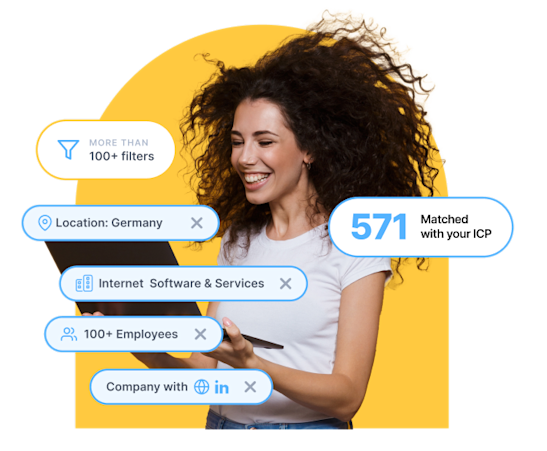AI tools like ChatGPT and Google Bard are disrupting sales as we know it, enhancing efficiency like never before. Sales professionals are saving over two hours a day by automating repetitive tasks with AI, freeing up time that can be spent on closing more deals.
AllSales
How to Use Tools Like ChatGPT for B2B Sales (+Prompts)
This article is also available in German.

When it comes to AI and sales, there's more to it than chatbots and creating prompts for email marketing. With the ability to analyze extensive amounts of data and provide actionable recommendations, AI empowers sales teams to make smarter decisions, optimize their strategies, and ultimately drive better results.
This article is all about how to leverage generative AI for B2B sales. We will discuss different ways to use tools like ChatGPT in all areas of the sales process – from outreach to sales coaching and customer research.
You will learn:
The do's and don'ts of using AI in sales.
How to personalize sales emails with AI.
How to use AI to learn more about your ICP.
How to create AI prompts for sales training and coaching.
What AI tools you can use to improve sales outcomes.
As many as 79% of salespeople claim that AI allows them to spend more time selling, let's explore how that's possible.
The pros and cons of using ChatGPT for sales
If you're going to use tools like Google Bard or ChatGPT for B2B sales, it's important to be aware of the do's and don'ts. Artificial intelligence can accelerate your sales efforts, help you close deals faster, and identify dream clients you didn't even know were out there.
However, if you use it the wrong way, it can be detrimental to your business, causing deals to break and giving your company brand a bad reputation. So, before getting into how you can use AI for sales, we need to sort out the pros and cons.
Pros of using AI in B2B sales:
Saves time and resources: Tools like GPT allow sales teams to focus more time and attention on selling and interacting with customers, which, in the end, is what really moves the needle toward closing deals.
Helps with personalization: Using AI to summarize and analyze customer data enables you to create personalized outreach messages, recommendations, and even deals.
Cons of using AI in B2B sales:
No human touch: A tool like ChatGPT can write sales emails, but it's not great at sounding human. When your customers get an AI-generated message these days, they notice. You need to take your time and add that human touch so your messages don't appear generic.
You can't trust it: AI is not always right. Sometimes, it gets confused and gives you incorrect information. When using AI tools, you always need to fact-check.
3 practical ways using ChatGPT for sales (+prompts)
With the pros and cons addressed, we're ready to dive into the day-to-day best practices of using ChatGPT for sales.
1. How to use ChatGPT for sales emails: Personalized outreach
You might think of artificial intelligence as the opposite of personalization. At this point, most of your customers have a stack of bland AI-generated cold pitches in their inbox – and you don't want to fall into that category.
People will remember how you made them feel, and you don't want yourself (or your company) to be remembered as the one who spammed them.
This doesn't mean you can't use AI for content creation, you definitely can. Just do it wisely and make sure to add the human touch. The bottom line is that when creating effective sales messages, you need to go the extra mile, but the good news is that AI can help with that.
You can use AI tools to personalize your outreach emails, standing out from the crowd, increasing your open rates, and improving customer engagement. However, please always make sure that this is in line with company guidelines, your internal AI policies as well as local legislation regarding use of AI and data protection!
Step 1: Download a free plugin like ChatGPT summary.
Step 2: Use the plugin to summarize your prospect's LinkedIn profiles.
Step 3: Use the insights to create personalized outreach messages.
Using a plugin like ChatGPT summary can save sales teams hours of work. Instead of scrolling through every prospect's profile and searching for relevant information, you get an automated summary with the most important bullet points. This way, you can use all the extra time to write really good, personalized sales emails.
You don't have to write each email from scratch – in fact, you shouldn't. Instead, create a range of sales messaging templates and personalize them based on the information AI provides.
The most important thing is that your messages feel personal. For example, if you find out that the prospect is a football enthusiast, you might want to reference that.
Whatever you do, don't use AI for mass producing a pile of generic sales emails; put in the extra time and make sure the message has a human mark. You want the prospect to know that you have taken the time to learn about their business and that you actually care about their success.
2. How to use ChatGPT for sales prospecting: Customer research
A whopping 85 % of sales professionals using AI claim that it makes prospecting more effective.
You can use a tool like ChatGPT or Google Bard to learn more about your ideal customer's needs, challenges, and preferences. This will help you in the prospecting process when you're identifying and qualifying leads who have the potential to become paying customers.
The preferred option would be to conduct a customer survey with your potential or existing customers, but it's not always possible, and in that case, using AI is the next best thing.
ChatGPT sales prompts for customer research:
What are the biggest challenges [job title] faces in their role?
What are the key priorities for a [job title] in the [industry]?
What are the current trends in [industry]?
What does success mean for [job title], and how is it measured?
What factors influence [job title] decision-making process when considering [product]?
What questions does a [job title] buying a [product] have?
What would stop [job title] from purchasing [product]?
What are [job title] long-term goals, and how can [product] help achieve them?
This information is valuable in the prospecting process and can help you identify talking points for sales calls and prioritize high-potential prospects for targeted outreach.
You can also use a sales prospecting tool like Dealfront to get notified when your prospects change positions, post on social media, visit your pricing page, and more. Reaching out to prospects at the right time increases your chances of closing deals.
3. How to use ChatGPT for sales performance: Sales training and coaching
How can ChatGPT prompts improve the sales performance? AI tools are great for crafting responses to common customer questions and objections, which can be valuable for sales training and coaching purposes.
You can start by asking ChatGPT something like, 'As a potential client of [company], what questions would you have?' and follow up with, 'How would you respond to these questions?'.
Improve your teams' (and your own) sales performance by role-playing and practicing responding effectively to AI-generated questions and objections.
ChatGPT sales prompts for training and coaching:
Imagine you're meeting with a prospect interested in [product] and has expressed concerns about [pricing, implementation, etc.]. How would you address their concerns and demonstrate the value of our offering?
The prospect has already expressed interest in our product and has scheduled a meeting to learn more, but has concerns about [pain point]. Please address these concerns and move the conversation forward.
Whether you're training new sales reps or preparing for an important sales call with a big potential client, these exercises can be very effective. Use them to perfect your sales pitch, overcome objections, and improve your sales techniques.
Another way to use AI for sales performance is to record, transcribe, and summarize sales calls. An AI tool like Wudpecker can do this for you, allowing you to use the insights to identify what you and your team members need to work on.
AI can also assist in analyzing your sales calls to find patterns and areas of improvement that you might not spot on your own.
Tips when creating ChatGPT sales prompts:
Know your audience: Before you start creating prompts, define your ICP.
Always fact-check: AI is a valuable time saver, but it can make mistakes.
Humanize it: Don't flood your customer's inboxes with generic AI messages.
Make it personal: Use AI to personalize your messages, not multiply them.
Be as detailed as you can: Bland prompts will generate bland answers.
Next level AI leverage: Training the LLM with sales data
LLMs (Large Language Models) like ChatGPT are pre-trained with a lot of knowledge, however, this knowledge is not always compatible with specific use cases that require unique company data.
You can take AI to the next level by not only creating sales prompts but actually training an LLM with your sales data.
This involves feeding the LMM a diverse range of sales-related information, like sales scripts, emails, chat logs, CRM data, sales reports, market trends, and competitor analysis. The goal is to teach the LMM to understand and generate text that is relevant to sales scenarios so it can provide accurate insights based on your company data.
Training the LLM with sales data can give businesses information about what their customers like, how they behave, and what they tend to buy. This allows companies to make their sales and marketing strategies more personalized, leading to better customer engagement, more sales, and happier customers.
AI tools for B2B sales
There are many AI tools out there that can help improve your B2B sales emails, prospecting, and overall sales performance. Which one to choose depends mainly on your budget, business needs, and goals.
ChatGPT summary
As mentioned earlier, ChatGPT summary can help you summarize prospects' LinkedIn profiles. The information and insights can then be used when creating personalized sales outreach messages. ChatGPT summary is a free plugin that does the job well, saving the sales team countless hours by not having to scroll through every prospect's LinkedIn profile and gather information manually.
Dealfront Connect
Dealfront Connect gives you access to comprehensive company profiles and helps you get a deeper understanding of your target audience. The tool provides you with company information like address, foundation year, industry, and company size. As well as contact details like positions, email addresses, phone numbers, and social media profiles – and it’s all GDPR-compliant.
Connect also offers a free Chrome browser extension that allows you to access company and contact details directly in your browser window, eliminating the need for hours of research.
You can easily get your hands on all of the relevant company and contact information from the website you're currently scrolling, with just one click. Helping you discover, engage, and convert your ideal B2B customers by getting all the information you need.
Wudpecker
Wudpecker is an AI note-taking tool that transcribes and summarizes sales calls and meetings. It can help sales reps capture essential information and create detailed notes. Wudpecker is suitable for sales training and coaching purposes, helping sales reps get an overview of their customer interactions and what they could have done differently. The notes also come in handy when sending follow-up emails to customers after meetings.
Gong
Gong is an AI-powered revenue intelligence platform that analyzes sales conversations and provides actionable insights to sales teams. Similar to Wudpecker, it records and transcribes sales calls, meetings, and demos. However, Gong is designed specifically for sales teams, with AI algorithms trained to analyze sales content for patterns and areas of improvement.
If you connect your Gong account to a CRM, you can also integrate it with Leadfeeder and receive automatic notifications when customers, for example, visit your pricing page or fill out a form on your website. This helps you narrow down potential customers who show real buying intent so you can focus your sales efforts on them.
How sales and marketing teams can use AI together
When discussing how to use ChatGPT for sales, it's almost impossible to not also touch on AI's effect on marketing. AI is changing the way sales and marketing teams operate, enabling them to work together more effectively than before.
Ensure relevant content of high-quality
The do's and don'ts when using AI tools like ChatGPT are mainly the same for sales and marketing. It's essential that any marketing or sales content produced is human-like, valuable for the target audience, and personalized when possible.
Tools like Google Bard and GPT are great for generating content ideas, outlines, and even first drafts, but it's important to humanize it before pressing publish.
For marketing teams, digital marketing strategies, like search engine optimization (SEO) and content marketing, are vastly impacted by AI. With the web getting flooded with AI-generated blog posts, Google is constantly changing its algorithms to make sure that the most relevant and high-quality content gets the best rankings.
For marketing teams, this requires a commitment to delivering value-driven content that resonates with readers while also living up to Google's SEO guidelines.
Create personalized customer experiences
One key way AI enhances collaboration between sales and marketing is through data analysis and predictive analytics. By making the most of AI algorithms, both teams can gain valuable insights into customer challenges, preferences, and buying patterns.
Marketing can use this data to create targeted marketing campaigns that resonate with specific customer segments, while sales can leverage predictive analytics to identify potential leads and prioritize their efforts accordingly.
Additionally, cutting-edge AI tools make personalized customer experiences possible across the entire B2B sales funnel. Through advanced customer segmentation and content personalization, marketing can deliver tailored messages to prospects at every touchpoint, from initial engagement to post-sale support.
Improve customer experience with AI chatbots
One of the most common uses of AI in sales and marketing is the implementation of chatbots for customer support. AI-driven chatbots can provide instant answers and information to customers, guiding them through the decision-making process and addressing their concerns in real time.
Chatbots can not only answer common customer questions but also recommend content, products, or services based on customer behavior and preferences, offering personalized assistance and driving engagement.
Free up time by automating tedious tasks
Last but not least, AI enables sales and marketing teams to automate time-consuming tasks, freeing up time and resources for more strategic initiatives. From lead generation, scoring, and qualification to email marketing and customer support, AI-powered automation can improve productivity across the board.
Ultimately, the synergy between AI, sales, and marketing drives business growth and success. By leveraging AI-driven insights, sales and marketing teams can work together more cohesively to attract, engage, and retain customers.
As AI continues to evolve, so will its impact on sales and marketing, offering new opportunities for collaboration in the pursuit of optimal business outcomes.
Will ChatGPT replace sales?
Since OpenAI and artificial intelligence entered the sales world, there's been an ongoing conversation about whether it will eventually replace human sales teams. The pro with AI is that it can do things faster and more accurately than a human, constantly analyzing and learning from extensive datasets. The con, however, is that it lacks the human touch.
ChatGPT, for example, can provide valuable support for B2B marketing and sales teams, but it can't fully replace the human interactions that are often crucial in closing deals. There's a place for AI in sales, and there's a place for humans. One doesn't need to exclude the other; instead, we need to find a way to coexist.
To create successful sales outcomes, it's essential to find a balance between leveraging tools like GPT and Bard for sales automation and maintaining meaningful human connections with customers.
While ChatGPT and other AI-driven tools excel in tasks like lead qualification, data analysis, and even initial customer interactions, they lack the emotional intelligence and intuition that human sales professionals bring to the table. Building trust, understanding nuanced customer needs, and navigating complex negotiations often require a personal connection that AI simply cannot replicate.
The human element in sales is invaluable for creating long-term relationships and brand loyalty. Customers appreciate genuine connections and personalized experiences that only human sales professionals can deliver. While AI can improve efficiency and scalability, it's the human touch that ultimately seals the deal and drives customer satisfaction.
In conclusion, while AI undoubtedly has a significant role to play in sales, particularly in streamlining processes and improving productivity, it's unlikely to replace human sales teams entirely. Instead, the future of sales lies in combining the strengths of AI with the unique abilities of human sales professionals, creating a powerful synergy that drives business growth.



